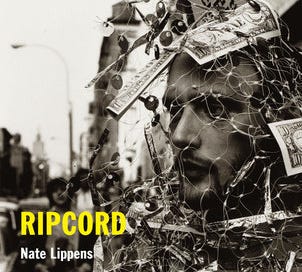"I do understand how people disappear. How the cost of interaction is too high. When you see who is comfortable in the world, who thinks it's theirs, how can anything but disappearance be an option?"
Ripcord, Nate Lippens’s second novel, continues his style of nonlinear narratives and meditations on life, love, class, and life as a gay man in America. His first book, My Dead Book, was full of memories of childhood, coming of age, and the friends lost to the AIDS epidemic. Ripcord largely takes place in the present day and can be seen as a continuation of the narrator’s life into later adulthood.
The narrator often comes back to his relationship with Dustin, a man already married to another man. Their relationship is rocky and seems doomed from the start. In many places, the narrator seems keenly aware of this, but still hopes for some way for it to work out.
This is main narrative through line of the book. Most of the chapters are told through brief observations or very short anecdotes, but Dustin comes back from the beginning to the end. This is even despite the cynicism towards relationships, and even hooking up, that the narrator expresses throughout the novel.
There is a great sense of humor in the novel. The narrator will often make snarky, but canny observations about his relationships, his encounters on hook-up apps, his dead-end catering job, and his life in general.
“People who don’t get self-deprecating humor and try to reassure you are the luckiest people in the world. They don’t understand when I say I’m a piece of shit, I mean they are pieces of shit too. I’m using myself as the stool sample for humanity.”
Lippens makes every sentence count, packing a lot of humor, meaning, and humanity in short, sharp observations.
Underneath, the main concern is the feeling of being unmoored and having little to connect oneself to the world, or even their local community. As a gay man, the narrator of Ripcord has been denied many of the milestones that are often said to define life. As such, he has to turn to things like art, close friendships, and relationships, no matter how fleeting, to have a rock to build on.
Even then, he is aware that his lack of money and connections means that he could be uprooted and forced to move on with little to take with him. In a few parts, he even briefly recalls times where he lost friends or was forced to move due to circumstances beyond his control. His view of them can best be described as reluctant acceptance.
“That’s the deck. This is the hand. What can you do?”
Ripcord is an excellent novel full of humor, humanity, and tragedy all packed into short fragments. Each sentence reads as meticulously crafted for incredible impact in only a few words. Nate Lippens proves himself to continue to be a fascinating author capable of expressing much more emotion in a 160 pages than other books can in two or three times as many.




